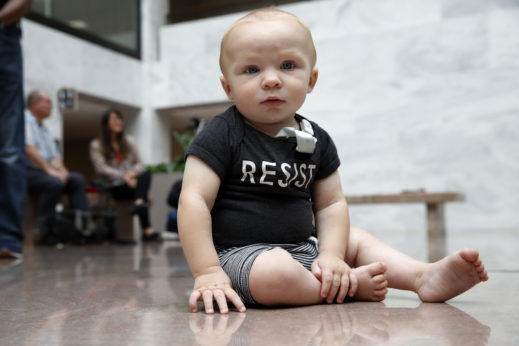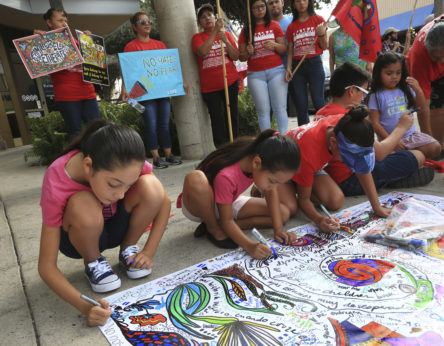
NEW ORLEANS—Recent years have seen many young people taking up the activist mantle and running with it. This year alone saw national walkouts to protest gun violence in high schools all across the country. There was also the March for Our Families and other demonstrations that brought multitudes of young people out for good causes.
Parents want to support their kids in these causes. But many have no clue about where and how to support their teens (and even younger ones becoming politically conscious) as they step into the activist experience. How does a parent even begin to tackle challenges such as the threat of violence and arrest that plague some of these events?
There’s also the matter of scheduling and ensuring that our kids understand the causes they decide to join. Experts who are also parents brought some tips for not only raising an activist child, but supporting them in smart, safe ways at a “Progressive Parenting” panel at the Netroots Nation conference in New Orleans this year.
The panel was moderated by Erin Matson of Repro-Action, a reproductive rights advocacy and resource group. Speakers included Greg Greene, Digital Campaigns Manager for Planned Parenthood; Mary Alice Carter, Executive Director of Equity Forward, a reproductive rights organization; Sabrina Stevens, Senior Manager of Campaign and Digital Strategies at the National Women’s Law Center; and Rachel Peronne, an education consultant formerly with the ACLU.
Parenting is political
Perrone started the discussion with an essential point—“parenting is a political act.” The nature of raising a child in a capitalist society soaked in white supremacy, misogyny, and anti-gay binary attitudes does require making some highly political decisions every day.
The choices parents make, the goals they set for their kids, and the hopes they have for their future are all political. So progressive parents should not feel like they aren’t doing enough for the movement while at home with the kids. Every day there are important choices parents make that can shape a little activist’s adulthood.

Greene broached the subject of activism and the safety concerns that events such as rallies, protests, and picket lines sometimes carry. The violence that is sometimes provoked at demonstrations and the arrests that follow are an example. No rational parent would want their child in such an environment. Of course, parents aren’t to blame when violence does erupt at what should be peaceful events, but safety and planning are the most important criteria for deciding when and where your activist kid can get involved. Sometimes, it’s okay to tell your little activist that they won’t be going to the rally due to safety concerns.
However, this does not mean the family sits at home watching Netflix instead. Greene urged parents to think about alternatives to attending protests that have the potential for becoming dangerous or to that event parents really just don’t have time to fit in the family’s schedule. He recounted a time when his family couldn’t leave home for a demonstration, so he contributed to the sacks of snacks for the organizers. In fact, making snacks for fellow activists is a very important, yet underrated job.
Other ideas were tossed about the room during the panel included playdates, babysitting (for the activist teenagers in need of a role), baking snacks, collecting coats, and even helping run errands to prepare for the event.
Matson talked about the signs her kids make. Sign-making is a necessity for any rally, and it’s an activity that can be done offsite. In thinking of smart alternative activities, parents can put the safety of their children first while also supporting the child’s wish to participate in a cause.
Activism comes in many forms
Think about the needs of protesters on the ground. How many of them have kids? Teens and older kids can help by organizing a babysitting schedule for the other parents or playdates to occupy the kids while the parents meet before the events. Being the “go-for” of the organization is another important job. It allows leaders to maximize time usually spent on administrative tasks and other activities. Gathering petition signatures at a closed event, using computer skills to run a website, or artistic abilities to create materials the organization needs—all of these can utilize a young activist’s energy.
These acts also work to teach children an important lesson in activism—that marching on the street is not the only way to participate in a cause. There are tons of jobs that organizations, coalitions, and unions need done to keep them going. The seemingly small acts are sometimes the most important for a cause, and everyone needs to help.
The skills needed to become an activist include more than just chants and sign-making. A good activist knows the cause, including the history that weighs heavily on everything in our country. Matson discussed this. She said she is raising the topics of white supremacy and misogyny in her home. Just living in this country, her white male son is being affected. She discusses privilege with him openly, followed by a talk of how he can use that privilege in the movement.

Arm your kids—with knowledge
To this end, Stevens talked about the responsibility that parents have to speak truthfully about the topics that our kids are interested in. When they come with questions, answer them. But answer only that question. Be truthful. This will ensure that we raise knowledgeable activists.
So many progressive parents are often unsure how deep to go with their explanations when their kids come home asking questions about abortion, hate crimes, or violent act they see in the news. Among the parent panelists, the response was unanimous: “Answer the question.” Don’t shave the facts or simplify the words thinking that the kids will understand. Stevens says it’s a myth that kids are incapable of understanding complex things. They know enough to come to you for help.
Before you answer the question, though, determine what it is really about. A child may have a question about something, but they may not always know exactly what they are really asking. When it comes to a sensitive topic, the last thing you want to do is feed them new information that doesn’t really address what they were concerned about. Stevens says to simply ask, “Where did you hear that?” or “What do you mean by that?” Then, take a second to gather just enough of an answer to satisfy the question. No more.
Remember that parenting is political, and the decisions parents make in raising a child in a society like ours are political acts. That’s enough of a start for raising a good activist. Parents should not be so hard on themselves, there are more than enough things to expend that guilt over.
It’s okay if the family misses that rally because of scheduling. It’s fine to pass up that protest because it doesn’t feel safe. These choices are enough to help shape your little activist—the information used to make those decisions and the actions that follow are all political. Just explain it to them; they’ll get it. That’s also progressive parenting.










